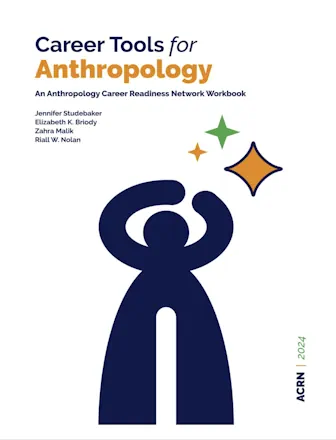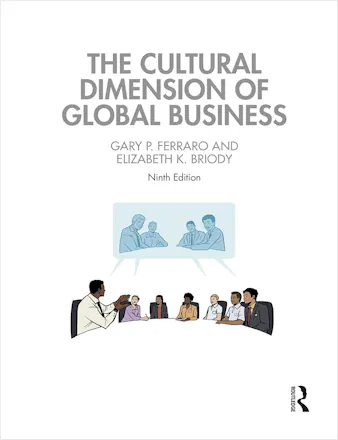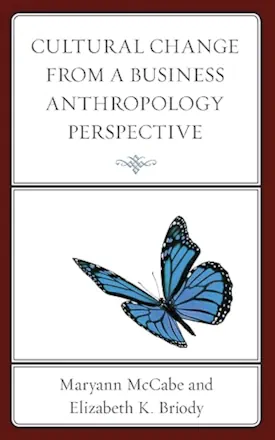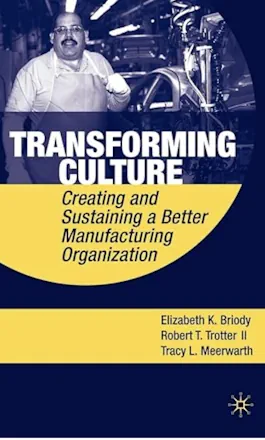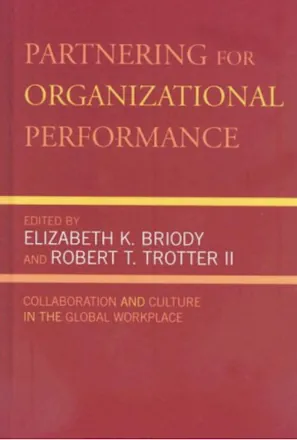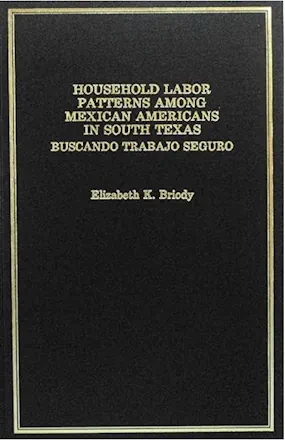Publications

Cultural Research
I developed an interest in work cultures while in graduate school. Since founding CulturalKeys LLC, I have been conducting research projects and consulting to improve organizational effectiveness in many industries.
More recently, my attention has turned to the culture of higher education, and to anthropology's disciplinary culture. While I continue to do research today, particularly on the topic of career readiness among anthropology students, my emphasis is largely on the development and use of career readiness resources by university students and instructors.
Career Tools for Anthropology
"What CAN you do with a degree in anthropology?" This Workbook answers that question and guides you through the possibilities of anthropology in the workplace.
Written with anthropology students, graduates, and instructors in mind, readers will learn how to assess their own skills, how to communicate the value of anthropology, and how to craft their own career path.
Each tool provides a guide on a career topic, such as basic skills like Crafting a Cover Letter to complex challenges like Reducing Polarization.
This Workbook features 39 peer-reviewed tools and exercises mapped along a career journey.
The Cultural Dimension of Global Business
Now in its ninth edition, The Cultural Dimension of Global Business continues to provide an essential foundation for understanding the impact of culture on global business and global business on culture.
The highly experienced authors demonstrate how the theory and insights of cultural anthropology can positively influence the conduct of global business, examining a range of issues that individuals, teams, and organizations face as they work globally and across cultures.
The cross-cultural scenarios presented at the end of each chapter allow students of business, management, and anthropology alike to explore cultural differences while gaining valuable practice in thinking through a variety of complex and thorny cultural issues.
Cultural Change from a Business Anthropology Perspective
This edited volume offers keen insight and useful lessons underscoring the value of practice to theory. Conceived by two anthropologists who lead consulting practices, McCabe and Briody selected contributors to explore how cultural change happens in a variety of consumer and organizational contexts.
The 12 case studies illustrate the explanatory potential and the problem-solving strengths of assemblage theory, and the role of human agency in provoking cultural change. The case studies are compelling due to connections between the case narratives and graphics, and researcher engagement in the pragmatics of implementation.
This book will be markedly useful to practitioners engaged in research and implementation. It will also appeal to students and instructors in a variety of fields including anthropology, business management, marketing, sociology, cultural studies, and industrial design.
Transforming Culture
This book was awarded the 2012 Robert B. Textor and Family Prize for Excellence in Anticipatory Anthropology from the American Anthropological Association.
Transforming Culture offers a discussion and exploration of American work culture that can serve as a guide for organizational-culture change through the description and explanation of a model for change used at GM.
The book describes the model, discusses culture-change tools that were derived from it, and descriptions of how the tools work.
It is a cautionary tale about the death and hopeful rebirth of manufacturing in the U.S. and provides important social commentary on the American Dream at the beginning of a new millennium.
Partnering for Organizational Performance
The increasing practice of working 24x7 does not only refer to providing customer service day and night. It also describes how work gets handed off from one time zone to the next, making business hours effectively all-day and world-wide.
Microsoft, the U.S. Department of Homeland Security, General Motors, and the Ford Motor Company all have embraced the advent of an increasingly global work environment. The result is that business today necessarily spans cultures, languages, and continents.
In this book, anthropologists Briody and Trotter bring together an array of practitioners and academics whose work demystifies the dynamics and life cycles of partnerships.
Household Labor Patterns among Mexican Americans in South Texas
This book investigates how Mexican American households in South Texas—particularly within the Rio Grande Valley—navigate labor dynamics amid agricultural and economic uncertainty.
Focusing on the intersection of subsistence farming, wage labor, seasonal migration, and non-agricultural employment, the study maps how family members share and shift labor roles to create stability and pursue job security ("trabajo seguro").
Grounded in participant observation and household surveys, this work captures how these communities employ adaptive, pragmatic strategies to mitigate low-income pressures and sustain household resilience in a structurally-constrained labor market.
Anthropology Articles
Click a tab to view the articles for that category.
Anthropology Training and Career Preparation: Key Takeaways from Focus Groups
How Career Ready Are Your Students?
A Career-Ready Curriculum for Anthropologists
Ten Things about the Public Stage
Why Don't People Think to Ask an Anthropologist?
Anthropology and Economics in the Public Eye
How Can We Improve the AAA Election Process?
Business Anthropology on the Road
The Coming of Age of Anthropological Practice and Ethics
High-Performing Applied Programs
Making "Anthropologists at Work": Lessons for Anthropologists
Anthropological Careers in Business, Government, and Private Sector Associations
The Missing Study Groups: Liminality and Communitas in the Time of COVID-19
Understanding Culture Through Pictures and a Thousand Words
Constructing a Comprehensive and Adaptive Survey for Cultural Analysis of Engineering Departments
Professional Staff Making a Difference: Cultural Change in Higher Education
Illuminating Staff Collaborations in Student Professional Development
Online Yet More Personal: Professors Respond to COVID-19 Crisis
Faculty Subcultures in Engineering and their Implications for Organizational Change
Breaking the Tyranny of Office Hours: Overcoming Professor Avoidance
Busy Times, Productive Students: Cutoff Points Marking Time in University Engineering Culture
Ritual as Work Strategy: A Window into Organizational Culture
Resource Usage and Usefulness: Academic Helpseeking Behaviours of Undergraduate Engineering Students
Entrepreneurship: A Challenging, Fruitful Domain for Ethnography
The Woes of Implementation Practice: Getting Caught by the "Program of the Month"
Working in Liminal States: Fluidity and Transformation in Organizations
Guiding Change as President of the Board of Trustees: Learning from the Liminal Drama of It All
Pursuing a Desired Future: Continuity and Change in a Long-Term-Care Community
Transforming Hospital Culture by Changing Discourse
Collaboration and Anthropology in Corporate Work
Managing Conflict on Organizational Partnerships
A Story’s Impact on Organizational-culture Change
Handling Decision Paralysis on Organizational Partnerships
The Knowledge Organization: Cultural Priorities and Workspace Design
The Life Cycle of Collaborative Partnerships
Discovering the Rules: Folk Knowledge for Improving GM Partnerships
Modeling Relationship Dynamics in GM’s Research-institution Partnerships
A Tale of two Career Paths: The Process of Status Acquisition by a New Organizational Unit
Reconciling Perceptions of Career Advancement with Organizational Change: A Case from General Motors
Reconstructing a Culture Clash at General Motors: A Historical View from the Overseas Assignment
Explaining Differences in Repatriation Experiences: The Discovery of Coupled and Decoupled Systems
Cultural Adaptation on Overseas Assignments
Fitting In: Newcomer Adaptation in a Corporate Research Setting
